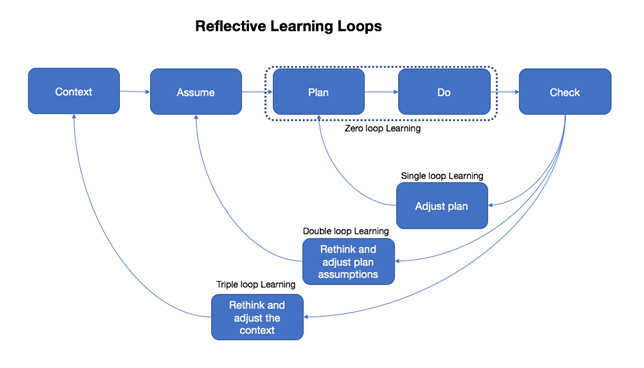Quenching the Organizational Pants on Fire: Double Loop Learning and What it Means for You
Working in a high paced, dynamic environment is fun but it can also be exhausting, especially when you see the same crises recurring over and over again. Like that friend who keeps repeating their unconscious patterns, unable to get their finances, relationships or work life together in the long term.
In an organizational context, I call this ‘fire fighting’. Where we might be good at putting out the fire, or urgent crisis, but we don’t stop and ask why the fires keep happening, nor do we prevent them from happening. This is where the work of Chris Argyris and Donald Schön’s “Double Loop Learning” comes into play: how we close the gap between what we THINK or CLAIM we do, and what we ACTUALLY do. For example, I might tell my employees to speak what is on their mind and contribute to discussions, but then I might dominate the conversation and fail to make space for them. And in doing so I might set up a bunch of unintended consequences that take me klonopin drug away from my goal.
The ability of an organization to learn depends on its ability to close the gap between what it CLAIMS to do and what it ACTUALLY does, i.e., its impact. The level of sophistication to which an organization can close its gaps can be explained by Argyris and Schön’s learning loops.
First you start with the context and from there you can figure out the deeper learnings.
Zero Loop learning means no feedback. Single Loop learning means reacting during the execution. Double Loop learning is a proactive process that questions the underlying assumptions and goals of the context. Triple Loop doesn’t have a universally agreed definition but it applies double loop learning to the original double loop learning context. i.e., reflecting another level deeper.
Let’s look at a few examples:
Context 1: Having efficient meetings
- Zero Loop Learning: We plan the meetings; we do them and never reflect on whether they are efficient.
- Single Loop Learning: You notice that the meeting is derailing and the facilitator brings it back on track.
- Double Loop Learning: Here we might ask what it is about our culture that makes our meetings derail, or what our definition of efficient is and whether it is valid.
- Triple Loop: Here we might question the necessity for meetings in the first place, or reflect on how honest we were with diagnosing the organizational cultural reasons for inefficient meetings.
Context 2: Project crises
- Zero Loop Learning: We don’t track our ability to meet the customer deadline. It gets done when it gets done.
- Single Loop Learning: Our project starts to derail and we create workarounds to get back on track.
- Double Loop Learning: We might deeply diagnose what is causing the need for workarounds. i.e., how valid is our original plan and do our processes actually work? Are we setting unrealistic deadlines? What long term solutions will prevent so many crises? How does our project culture support us (or work against us) in preventing these project crises?
- Triple Loop Learning: We might ask how honest we are in our diagnosis of the problem, or whether our organizational culture allows long term solutions rather than relying quick fixes in projects. i.e., does senior management make heroes out of the company ‘firefighters’, or the ‘fire preventers’? To what extent are we willing to understand the complexity of why we have so many fires vs. do we just want someone else to solve the problem and fast? What is my role in contributing to a fire fighting culture and how well am I learning to close the gap between where we are and where we need to be? To what extent do we set time aside to stop and reflect on what is going wrong and why.
Having worked in a number of organizations with ‘pants on fire’ approaches, I noticed that the main cause is the need to stop, pause, reflect, and understand the complexity and whole system. Companies often underestimate the effort required to solve a problem properly: they fail to allocate the resources and time, and either cannot understand, or fail to acknowledge, the cultural component: i.e., what behaviors and attitudes are preventing success? If however, we make the time to stop and reflect, we can stop, drop, roll and finally take off the flammable trousers.
Satya Tanner had a 16-year career as a pilot and aerospace engineer in the Royal Australian Air Force, leading people and managing projects. She has studied Prout at a post graduate level and has a passion for helping organizations and communities that are in search of innovation, leadership, healthy cultures and conscious business principles.














